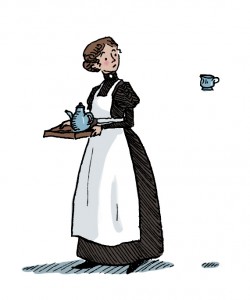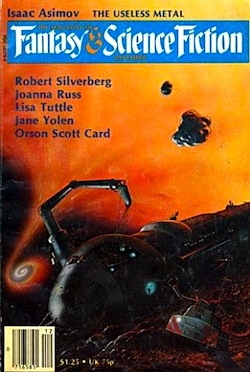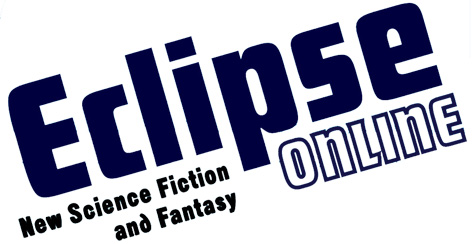Welcome to the Short Fiction Spotlight, a new series of reviews and discussions. As the title implies, a few times a month in this space I (and my co-conspirator, the delightful Niall Alexander) will be discussing exclusively short fiction, attempting to do some critical justice to the wealth of short stories being published throughout the field—and then some. I intend to cover a few new stories each month that strike my fancy, from various and sundry publications; I’ll also occasionally discuss an older story or two when I come across one that really catches my interest. Of course, this isn’t intended to be comprehensive—it’s a conversation about stories, not a retrospective of everything published in a given month. (And since it’s a conversation, feel free to pitch your recent short reads in the comments, too.)
For this opening installment, to give a sense of how my half of the Short Fiction Spotlight will go, I’d like to discuss one fresh story and one from somewhat longer ago: “Invisible Men” by Christopher Barzak in Eclipse Online and “Wives” by Lisa Tuttle.
 Eclipse Online is Jonathan Strahan’s newest venture, published and hosted by Night Shade Books. The fiction so far has been engaging and of decent quality, but one story in particular stands out from the past month or so: Christopher Barzak’s H.G. Wells pastiche, “Invisible Men.” Told by Millie, the servant girl who has been working at the inn since her mother’s death when she was twelve—the real invisible person—the story explores dimensions of “invisibility” in terms of class, gender, and position. The Invisible Man himself comes across quite differently, from Millie’s point of view, as well. His erratic and often unethical behavior is given a shade of sympathy, made all the more poignant by the fact that, when he reaches out for her upon his discovery, she still reacts negatively. Millie considers, after his flight and eventual death:
Eclipse Online is Jonathan Strahan’s newest venture, published and hosted by Night Shade Books. The fiction so far has been engaging and of decent quality, but one story in particular stands out from the past month or so: Christopher Barzak’s H.G. Wells pastiche, “Invisible Men.” Told by Millie, the servant girl who has been working at the inn since her mother’s death when she was twelve—the real invisible person—the story explores dimensions of “invisibility” in terms of class, gender, and position. The Invisible Man himself comes across quite differently, from Millie’s point of view, as well. His erratic and often unethical behavior is given a shade of sympathy, made all the more poignant by the fact that, when he reaches out for her upon his discovery, she still reacts negatively. Millie considers, after his flight and eventual death:
What did he want from me, I wonder sometimes, when he ran after me into the kitchen, calling my name out? I was afraid then, and didn’t stop to ask. But when I look back now, I sometimes think I can see round that fear to hear his voice again. To understand that he weren’t angry at me, like I thought. He’d sounded frightened as I was. The same way I sometimes come into a room and see a mouse, and both of us jump at the sight of each other. What did he want from me?
The inability to connect between Millie and the Invisible Man, between invisibilities, is an interesting thematic concern that runs under the surface of the story and gives it its unique angle. (After all, Wells’ stories aren’t exactly strangers to being adapted.) The natures of invisibility for a servant girl and for a poor young man who stole to make it through university are contrasted: invisibility made real isn’t as seductive as it might be, for Millie, who doesn’t much care for her own position in life as it is. Her reflection on her dead mothers’ stories—the stories in which Millie was always the heroine—adds another touch of depth to her character. Millie is not necessarily content with her invisibility, no matter her words at the close of the story—she is a more complex person than that, more conflicted and more real. What might otherwise be a playful retelling of a Victorian pulp-science fiction story is made more memorable by the slow and delicate piecing together of Millie’s multifaceted personality, in contrast with that of the Invisible Man and his later invisible disciples, acting out at the society that has turned its back on them.
 Of course, it won’t always be new stories on the docket, here. One older story that has lingered with me long after the initial reading—and that I haven’t had a chance to talk about before—is the disturbing and provocative “Wives” by Lisa Tuttle. “Wives” was initially published in The Magazine of Science Fiction and Fantasy’s December 1979 issue. It’s been reprinted some, but not as much as I might have expected: according to the ISFDB, it’s been in only three anthologies since the initial publication (The Best from Fantasy and Science Fiction 24th Series, The Penguin Book of Modern Fantasy by Women, and Daughters of Earth: Feminist Science Fiction in the Twentieth Century) and one story collection by Tuttle herself.
Of course, it won’t always be new stories on the docket, here. One older story that has lingered with me long after the initial reading—and that I haven’t had a chance to talk about before—is the disturbing and provocative “Wives” by Lisa Tuttle. “Wives” was initially published in The Magazine of Science Fiction and Fantasy’s December 1979 issue. It’s been reprinted some, but not as much as I might have expected: according to the ISFDB, it’s been in only three anthologies since the initial publication (The Best from Fantasy and Science Fiction 24th Series, The Penguin Book of Modern Fantasy by Women, and Daughters of Earth: Feminist Science Fiction in the Twentieth Century) and one story collection by Tuttle herself.
I first read this during the course of a seminar on science fiction and gender in early 2010; since then, I’ve thought of it regularly, particular when asked to consider the feminist science fiction of the seventies, though it comes in late in the pack. The story is vicious, so clear in its thematic content as to be didactic (though in a way that I find acceptable and evocative), and eerie enough at the close to leave a lasting imprint. The impression it gives of the tools of patriarchy—war, hobbling clothing, external violence begetting inter-communal policing (the idea of “token torturers” is certainly echoed in the closing), and control of natural sexuality, among others—is harsh under the light of an alien society with “women” entirely constructed from a different species.
The critique of the domestic household and the means used to uphold it in “Wives” is not entirely original, of course. That on its own wouldn’t be enough to stick out to me so strongly. It isn’t merely the social commentary—the way that the wives are made into wives—but the hideously vivid descriptions of the alien species being forced into the roles of a gender that is entirely unwelcome to them. It reminds me, in a visceral way, of the ways in which gender is policed in contemporary culture as well: frequently, it is forced like an ill-fitting and strangling suit onto human beings who identify in ways that do not match the dominant hierarchy’s demands. After having cut off her skintight, “Susie” attempts to reclaim her own body from the false shape it’s been bound into:
She looked down at her dead-white body, feeling distaste. She felt despair at the sight of her small arms, hanging limp, thin and useless in the hollow below her ribs. She tried to flex them but could not make them move. She began to massage them with her primary fingers, and after several minutes the pain began, and she knew they weren’t dead yet.
The prose is simple, yes—but the simplicity hides a series of ever more graphic and haunting images of these alien bodies and the damage inflicted on them by the human men who have colonized their planet. In the end, “Susie” cannot continue being a wife, and is devoured by the other wives to keep their society alive rather than destroyed by the human men. As I’ve said, it’s quite clearly didactic, but that doesn’t make it any less effective in its discomfiting and startling images.
If you’d like to nab a copy of this story for yourself, I’d recommend the still in-print Daughters of Earth—great anthology, with a few more brilliant classic stories in it that might pop up here later.
Lee Mandelo is a writer, critic, and editor whose primary fields of interest are speculative fiction and queer literature, especially when the two coincide. She can be found on Twitter or her website.











This is such an awesome idea. Really happy to have more attention given to short fiction! Tor.com always posts some awesome short stories themselves; it only makes sense to extend the coverage. Thanks for doing this!
@joannawrote
Thanks! I’m looking forward to doing it.